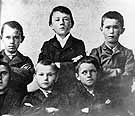
|
|
|

|

|

|

|
|
Click on an image to see a larger, more detailed picture.
|
|
|
|
|
| PROLOGUE: Roots of the Holocaust |

|
pg. 29 |

|
|
|
|
| |
 The Young Hitler
The Young Hitler
Adolf Hitler (center) grew up in an authoritarian household. His father, an Austrian customs official, was quick-tempered and overly strict, and Adolf drew much closer to his overindulgent mother. It was from his father that Hitler acquired many of his personality traits. Hitler was born on April 20, 1889, in Braunau am Inn, an Austrian town on the German border. Little Adolf was spoiled by his mother, but did not have a happy childhood. He and his father quarreled frequently, and the boy was moody and discontent. A lazy and disinterested student, he dropped out of school at the age of 16 to pursue his dream of becoming a painter. Crushed and bitterly disappointed when he failed the entrance examination to the Vienna Academy of Art in 1907, Hitler spent the next five years enduring a miserable existence in Vienna. Living in men's hostels, unshaven, and shabbily dressed, he barely eked out a living by hawking his sketches at local cafes and taverns. This period in Vienna was, he remembered, "the hardest, but also the most thorough, school of my life." There, his ideological foundations became established.
Photo: Stiftung Dokumentationsarchiv des österreichischen Wilderstandes
|
|
Adolf Hitler's Vision Adolf Hitler wore no signature spectacles, but his racist, antisemitic vision meant that the pair Sophie Gerlich received in the early summer of 1934 were by no means the only ones that belonged to Nazi victims. When the Soviet Army liberated Auschwitz-Birkenau 11 years later, they found huge amounts of loot, which had been taken from the Jews who were murdered there. The loot included not only millions of pieces of clothing and tons of human hair but also mounds of eyeglasses. None of those spectacles or any others that could have been prescribed would have corrected Hitler's vision, however. His outlook--distorting and defacing human life nearly beyond recognition--won a following strong enough to govern Nazi Germany and to dominate most of Europe from 1933 to 1945. Mein Kampf contains the core of Hitler's vision. But as we shall see, it raises questions that go farther back than the 1920s or the turn-of-the-century world into which Hitler was born in Braunau, Austria, on April 20, 1889. Disagreements persist about the precise origins of Hitler's antisemitism. No reputable scholar would deny, however, that Hitler was incorrigibly antisemitic well before he met Fritz Gerlich in Munich during the spring of 1923. Nor would any serious interpreter repudiate the view that Hitler's antisemitism was unwavering. His hatred for Jews was so unrelenting that the political testament he signed on April 29, 1945--one day prior to his suicide and less than ten days before the Third Reich surrendered--ended by ordering "the government and the people to uphold the race laws to the limit and to resist mercilessly the poisoner of all nations, international Jewry." Hitler's own account of the beginnings of his antisemitism is sometimes at variance with sources that locate them prior to his first visit to Vienna in May 1906. Nevertheless, Hitler's emphasis on the formative quality of his experiences in that city, before he moved to Munich in 1913 at the age of 24, reveals that he found the imperial capital of Austria-Hungary to be very different from provincial Linz, his hometown, where he first heard the music of the antisemitic composer Richard Wagner, who long exerted strong influence upon him. Vienna alienated, captivated, and educated Hitler all at once, and in decisive ways that he could not have anticipated.
|
|

|

|

|

|
 1874: After a long process, Jews in Switzerland receive full rights of citizenship under the new constitution.
1874: After a long process, Jews in Switzerland receive full rights of citizenship under the new constitution.
|
 1878: The antisemitic German Christian Social Party is founded by Adolf Stoecker, a court chaplain. The party demands that Jews convert to Christianity.
1878: The antisemitic German Christian Social Party is founded by Adolf Stoecker, a court chaplain. The party demands that Jews convert to Christianity.
|
 1880: Petitions signed by 250,000 Germans demand that the government ban Jews from German schools and universities--and from holding public office.
1880: Petitions signed by 250,000 Germans demand that the government ban Jews from German schools and universities--and from holding public office.
|
 1880s: Anti-Jewish pogroms break out across Russia.
1880s: Anti-Jewish pogroms break out across Russia.
|
 1881: Eugen Karl Dühring publishes an antisemitic book in Germany, Die Judenfrage als Rassen-, Sitten-, und Kulturfrage (The Jewish Question as a Racial, Moral, and Cultural Problem).
1881: Eugen Karl Dühring publishes an antisemitic book in Germany, Die Judenfrage als Rassen-, Sitten-, und Kulturfrage (The Jewish Question as a Racial, Moral, and Cultural Problem).
|
|
|
|
|
| PROLOGUE: Roots of the Holocaust |

|
pg. 29 |

|
|
The Holocaust Chronicle
© 2009 Publications International, Ltd.
|
|
